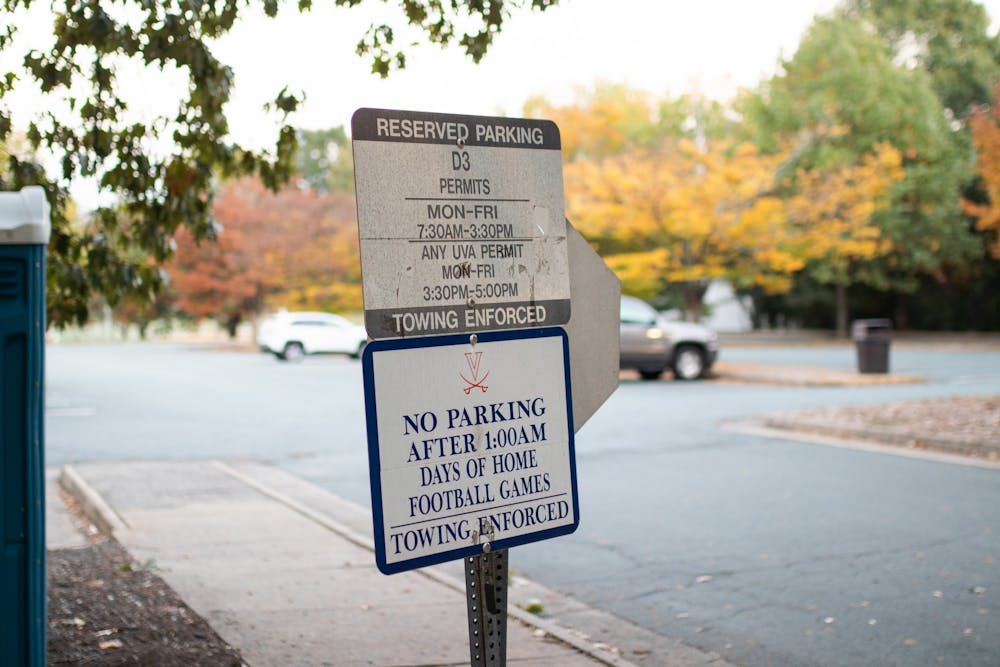If you are an upperclassman living on Grounds, you can purchase an on-Grounds parking permit. However, some on-Grounds lots have the bizarre condition that you must move your car on days Virginia football plays in Charlottesville — otherwise, you will be towed or ticketed. D3, S6 and S9 parkers must move their car on these days. The D3 lot is an offsite parking location by the School of Law that students can use if they live in on-Grounds housing with onsite parking, such as Lambeth and Faulkner apartments. S6 is an overflow lot option for students at Bond House, Bice House and Hereford Residential College, as well as the only option for students living in language houses. S9 is the onsite lot for Hereford. Over 800 permit holders at another offsite location, Emmet/Ivy Garage, were forced to move their cars farther away from Central Grounds to John Paul Jones Arena last month, as a result of increased demand for on-Grounds parking. D3, S6 and EIG permit holders pay $324 for their annual permits — as opposed to the $600 most onsite parking permits cost, including the S9 lot. Even if students pay a reduced price, however, we should never be required to move our cars from their permitted lot.
The University acknowledges D3, S6 and EIG lots as offsites for undergraduate housing residents. Our cars are not right outside our door when parked in these offsites — they can be a 30-minute walk away. As someone who lives at Lambeth and parks in the D3 lot, I can tell you that walking up the incline of Arlington Boulevard is miserable in the summer heat, and it will be worse when temperatures plummet. And as someone who regularly walked from Bice House to EIG last year, I know that those now having to walk to JPJ will also be miserable. Though one could use public transportation, walking is often quicker than waiting for the bus, especially in the early morning or late at night.
The University incentivizes offsite lots by reducing their cost, but those of us who keep our car in these offsites still pay hundreds of dollars to do so. Whether $324 or $600, charging students to park somewhere they already pay thousands of dollars to live at is absurd. That some of us should then have to move our car from the lot we pay for only amplifies this absurdity. I should never have to move my car, barring extenuating conditions. My anger over this would only grow if I parked at the S9 lot, paying $600 and yet still having to move my car every gameday.
Moreover, mandatory vacates are ridiculous, particularly for D3 permit holders. While I understand the need for gameday parking — given the many visitors football brings to Grounds — the D3 lot makes no sense as a place to park for football games. The walk from this lot on North Grounds to Scott Stadium is nearly 40 minutes. I can almost guarantee the visitors having to park there are not elated to make that walk both to and from the stadium, especially if it is hot, cold or raining. A free shuttle takes people to the stadium, but this shuttle only begins 90 minutes before kickoff. I have seen the people walking in their orange and blue down Emmet Street from the D3 lot. Moreover, the University’s “Event Parking” webpage does not let visitors know it forces students to move their cars to make room on gameday. Perhaps the University should construct a new lot closer to Scott Stadium to limit the inconvenience to football fans, but it should not be forcing students out of their permitted lots.
Furthermore, this requirement is not explicitly stated when purchasing your permit. It appears nowhere on the parking portal as you buy your permit, and on the University’s “Student Parking” webpage, it appears only at the very bottom. The page dedicated to mandatory vacates is difficult to locate on Parking’s website. One must click on the “Parking” tab, then “Permits” and finally “2022 Football Parking,” a title that does not indicate the page’s contents. University Parking emails permit holders for certain lots a few days before game day — or at least it is supposed to. I received a citation for leaving my car in the D3 lot in August, as I neither knew about mandatory vacates nor received an email reminder. After a month-long appeal process, Parking finally dropped the citation. Not every student keeps track of the football schedule, making those email notifications necessary, but my experience has shaken my trust in Parking to actually remind us. If the University continues to require permit holders to vacate, it should make them extremely evident for buyers and should ensure it always reminds permit holders.
As a D3 permit holder, I feel particularly slighted because of my undergraduate status. This lot is primarily for students in the School of Law, who usually drive back to their house or apartment after class each day. If I happen to be parking there late at night, the lot is nearly empty. Thus, requiring permit holders to vacate lots on gameday primarily impacts those who actually need the lot on weekends — undergraduate students. This is unacceptable, and the University should change its policy on mandatory vacates. I do not care what special event is happening, we should never have to move our cars.
Bryce Wyles is an Opinion Editor for The Cavalier Daily. He can be reached at opinion@cavalierdaily.com.
The opinions expressed in this column are not necessarily those of The Cavalier Daily. Columns represent the views of the authors alone.







